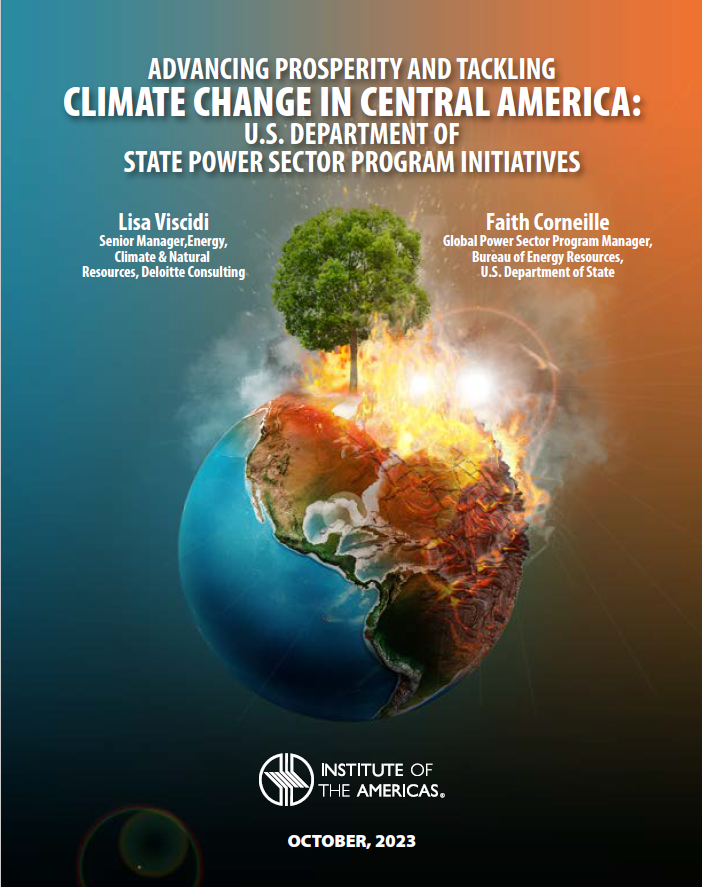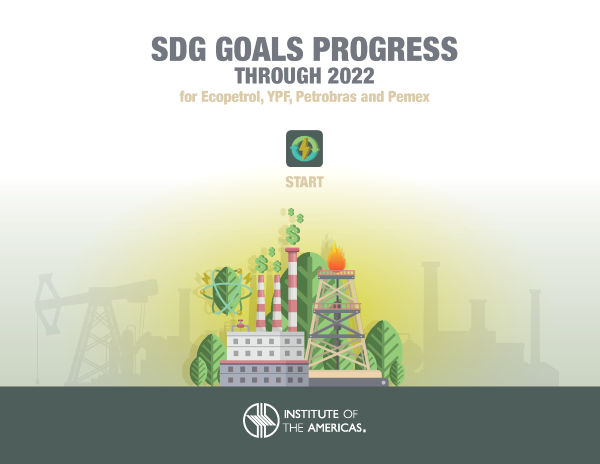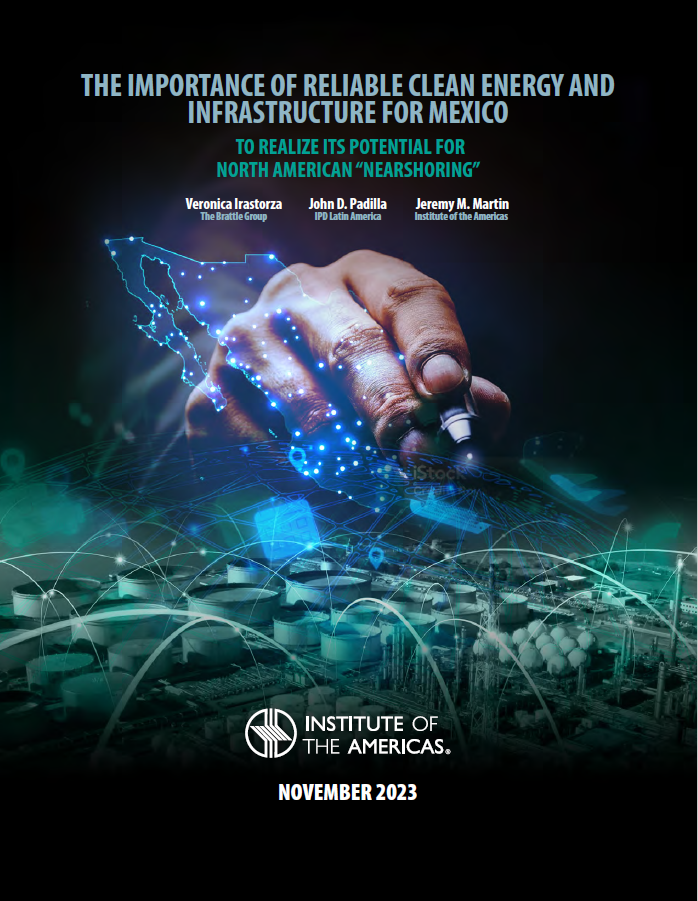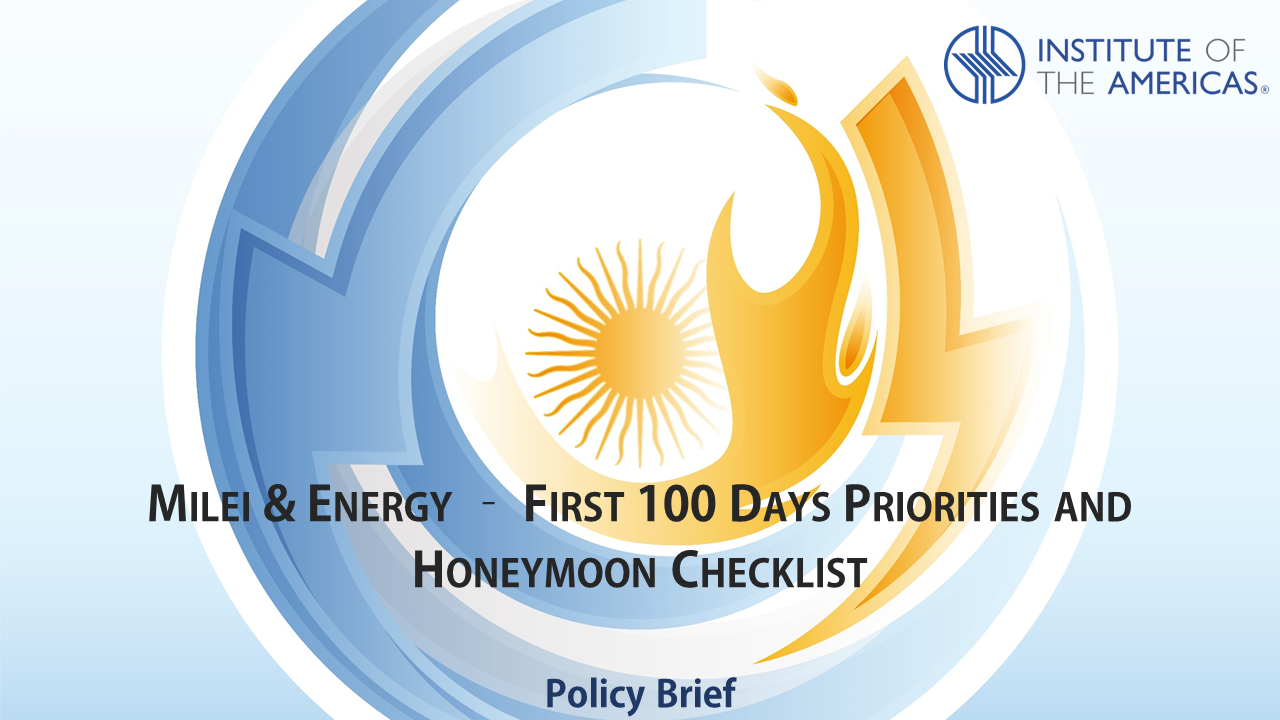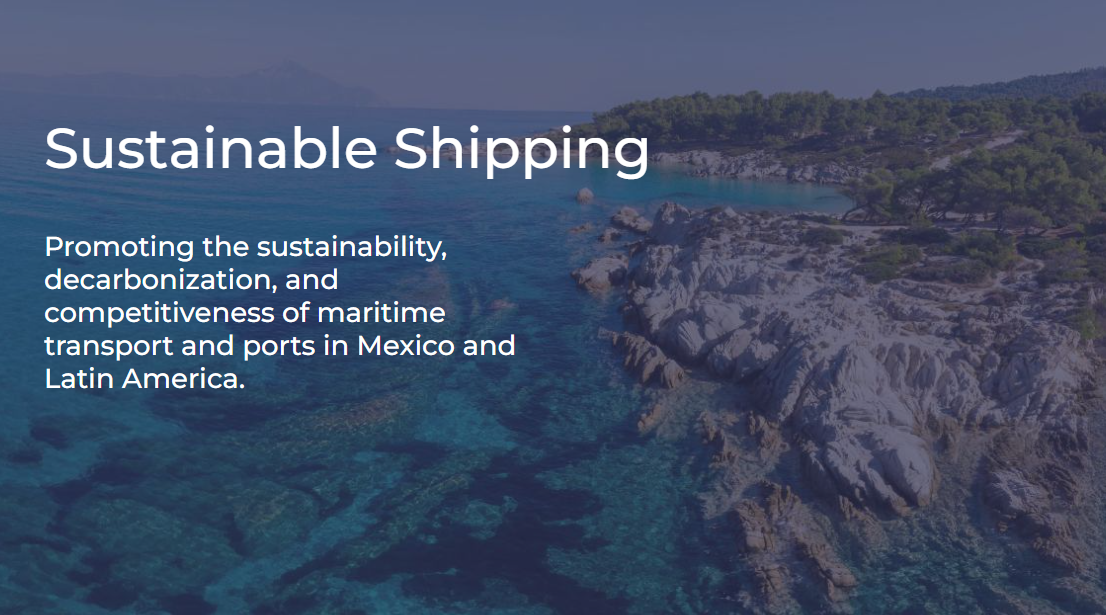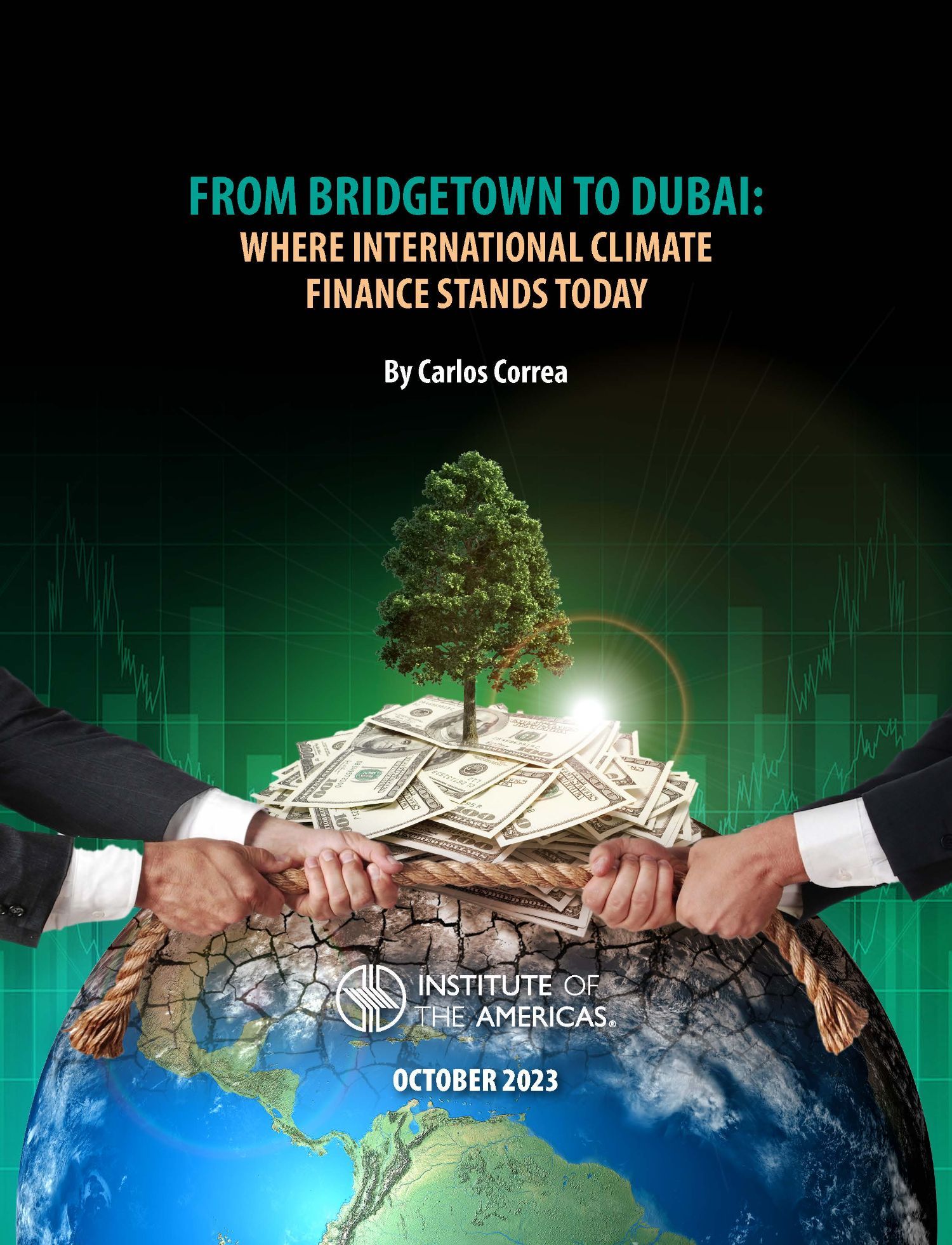


Due in part to climate change, the extreme weather events we’ve experienced across the Americas this past year (which may have once been considered historically atypical) are now becoming a regular occurrence. The impacts have ranged from a mega drought across the U.S. Southwest and Mexico; historic flood conditions in the U.S Southeast; and wildfires along Argentina’s Parana River waterway as well as the recent hurricanes impacting coastal residents from as far north as Canada’s Atlantic Provinces to the Gulf of Mexico and the Caribbean.
Q4 – 2023
President’s Column

As 2023 comes to an end, the board, staff and non-resident fellows of the Institute of the Americas (IOA) have much to be grateful for and celebrate. In our first full year of post-COVID operations, IOA organized 17 convenings that included the participation of over 1,200 representatives from the public and private sectors as well as civil society and academia. We hosted events here in California, in Argentina, Brazil, Mexico as well as our annual energy conferences in La Jolla and Madrid.
Features
The Institute of the Americas pleased to its 2023 annual report highlighting our work over the past year in the areas of energy, environment & climate change and economic competitiveness.
Programs
Energy & sustainability
The fourth quarter began with the XXXII annual La Jolla Energy Conference on October 11-12 featuring a wide range of high-level public and private sector officials from the hemisphere.
Later in October and November, we hosted the first edition of our “Energy Ambassadors” workshop and training in the Mexican State of Sonora.
We published several briefs and reports focused on energy and nearshoring in Mexico, energy in Central America, a brief focused on the Milei administration in Argentina, as well as a unique infographic assessment of four Latin American NOC and their energy transition performance.
We ended the quarter and year focused on programs for the early part of 2024, with a keen eye on the intersection of energy and policymaking for the new Milei government and across Mexico’s unfolding presidential election cycle.
XXXII La Jolla Energy Conference

On the first day of the XXXII La Jolla Energy Conference, panelists and attendees shared experiences and knowledge as part of our Big Debates around decarbonization, energy security, digital transformation, the role of industrialization policy, geopolitics and a nightcap roundtable about China and Latin America. The second day continued with transcendental questions on the role of natural gas, the concept of electrifying everything and discussion of critical minerals in the region.
A series of deep dives into the energy sector outlooks in Brazil, Argentina, Chile and the Caribbean concluded the conference.
Sonora Energy Ambassadors
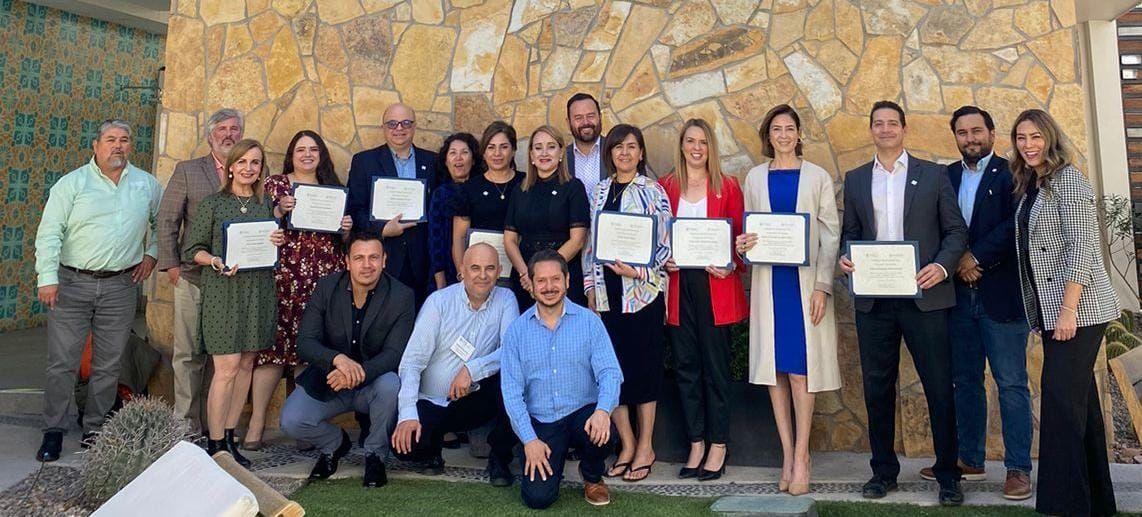
In late October and early November, we launched and hosted the first edition of our “Energy Ambassadors” workshop and training in the Mexican State of Sonora. Leveraging our efforts in reports and briefs to foster a deeper understanding of the key issues facing Latin America and the Caribbean’s energy sector, we have also hosted dedicated “energy literacy” workshops.
Thanks to the support of Sempra Infrastructure, we were pleased to be able convene in Hermosillo, Sonora this year, after years of sessions with citizens across Baja California.
A series of deep dives into the energy sector outlooks in Brazil, Argentina, Chile and the Caribbean concluded the conference.
Advancing Prosperity and Tackling Climate Change in Central America
National Oil Companies (NOC) Comparative Analysis Infographics
Report and Webinar – Importance of Reliable Clean Energy and Infrastructure for Mexico to Realize its Potential for North American Nearshoring
Our combined report and webinar sought to examine the specific challenges and potential energy-related solutions that will help determine just how successful nearshoring in Mexico ultimately becomes. As our report discusses, nearshoring is here, no longer just a possibility, but starting to have a tangible impact. Further regionalizing North America’s supply chains through nearshoring helps to reduce dependence on far-flung trade routes, minimizes delays, and achieves greater certainty and control over supply and manufacturing. Electricity has proven to be a particularly complicated challenge given the current state of electricity infrastructure, supply-demand dynamics, and the government policies currently being pursued. As we discuss, it may not only be an additional cost, but a potential deal-breaker for potential nearshoring companies.
Milei & Energy – First 100 Days Priorities and Honeymoon Checklist – Policy Brief
Javier Milei won a resounding victory in Argentina’s election on November 19. Having only served one term in Congress and with little formal political background or party apparatus, his 12-point defeat of Sergio Massa the Peronist candidate grabbed international headlines. That a political outsider who campaigned with a chainsaw and a draconian message won such a resounding victory underscored society’s desire for change.
This brief focuses on how the Milei administration can begin to deliver on those expectations as it pertains to the nation’s energy sector. With the additional caveat that these are also points to be considered and pursued in the first 100 days. Call them the honeymoon checklist.
ENVIRONMENT & CLIMATE CHANGE (EC2)
Sustainable Shipping Initiative Launched
After two years of work, mostly focused on ships’ scrubbers and their polluting discharges, we expanded the scope of our work to promote the overall sustainability of shipping and ports in Latin America—with the invaluable help of a wide network of partners. Through thought-leadership, technical assessments, sharing of best practices, and multi-stakeholder convenings, we aim to advance actions that reduce the environmental impacts and carbon footprint of vessels and ports.
We are convinced that these actions not only help decarbonize the industry, but also make it more competitive globally. Visit our new website to learn more!
Announcement: Champions for Sustainable Shipping in Mexico
On December 13 in Mexico City, the Mexican Chamber of the Maritime Transportation Industry (CAMEINTRAM), the IOA and WWF Mexico launched the Champions for Sustainable Shipping in Mexico initiative, which seeks to encourage all actors involved in the industry to emerge as global leaders in defense of true sustainable practices in the shipping and ports sectors, promoting their decarbonization and improving the well-being of communities and ecosystems alike.
The announcement was made at CAMEINTRAM’s year-end holiday party, attended by members of the Chamber, the Mexican Navy and maritime authorities, the Maritime Sector Commission of the Chamber of Deputies, and several organizations linked to the industry in Mexico.
Through this call to action, we seek to mobilize relevant stakeholders, particularly those in the private sector, to support transformational change towards a low-carbon and sustainable maritime and port industries in Mexico that minimize waste, environmental and health impacts, and promote a just transition. In the long term, the goal is to focus on infrastructure, production, storage and supply of scalable zero-emission fuels, including net-Zero operations along the value chain. The Champions can be any non-governmental actor that is directly or indirectly involved in the sustainable development of the maritime and port sectors, and committed to the objectives outlined above. More details will be published here soon.
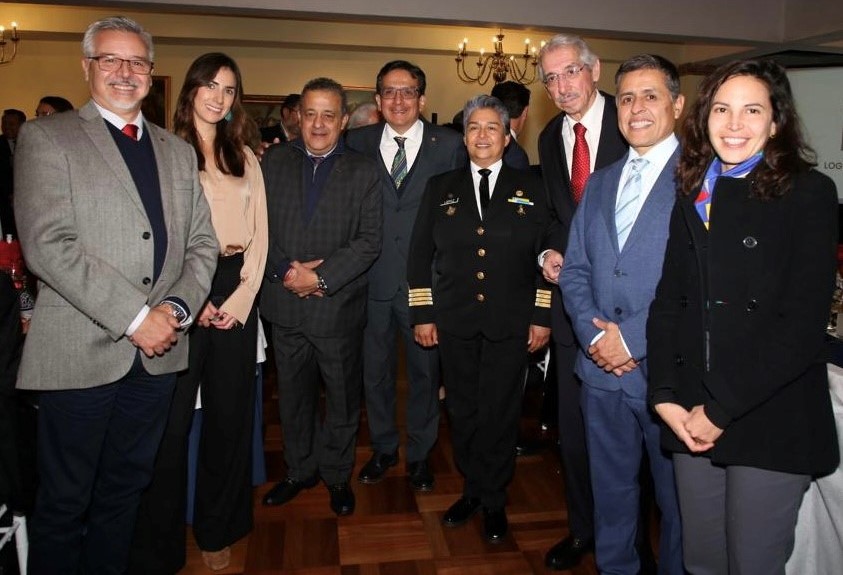
Report: From Bridgetown to Dubai: Where International Climate Finance Stands Today
This short brief by EC2 non-resident fellow Carlos Correa discusses the current state of international climate finance and the urgent need for increased funding to address the daunting magnitude of the climate crisis. We currently face a $700 billion funding gap for biodiversity, climate, and nature. It takes the reader through a short timeline of key moments that led us to where we are today, from the Bridgetown Initiative—promoted by Barbados Prime Minister Mia Mottley—to the recently held COP28 in Dubai, which played a crucial role in setting the new climate finance goals.
Loreto 2050 Workshop
Baja California Sur is currently going through a public review process of the urban development plans proposed for each municipality. To catalyze dialogue between key stakeholders and the government responsible for implementing development plans initiatives, the Institute of the Americas, in partnership with GeoAdaptive and EcoAlianza de Loreto designed a participatory workshop with 41 representatives from various sectors in Loreto. The first day was dedicated to identifying trends in Loreto’s growth, drivers of change, and elements highly valued by society; while the second day was dedicated for participants to reflect on Loreto’s future.
The goal of this two-day workshop was to reach a consensus on the direction in which residents would like to steer the future of the municipality.
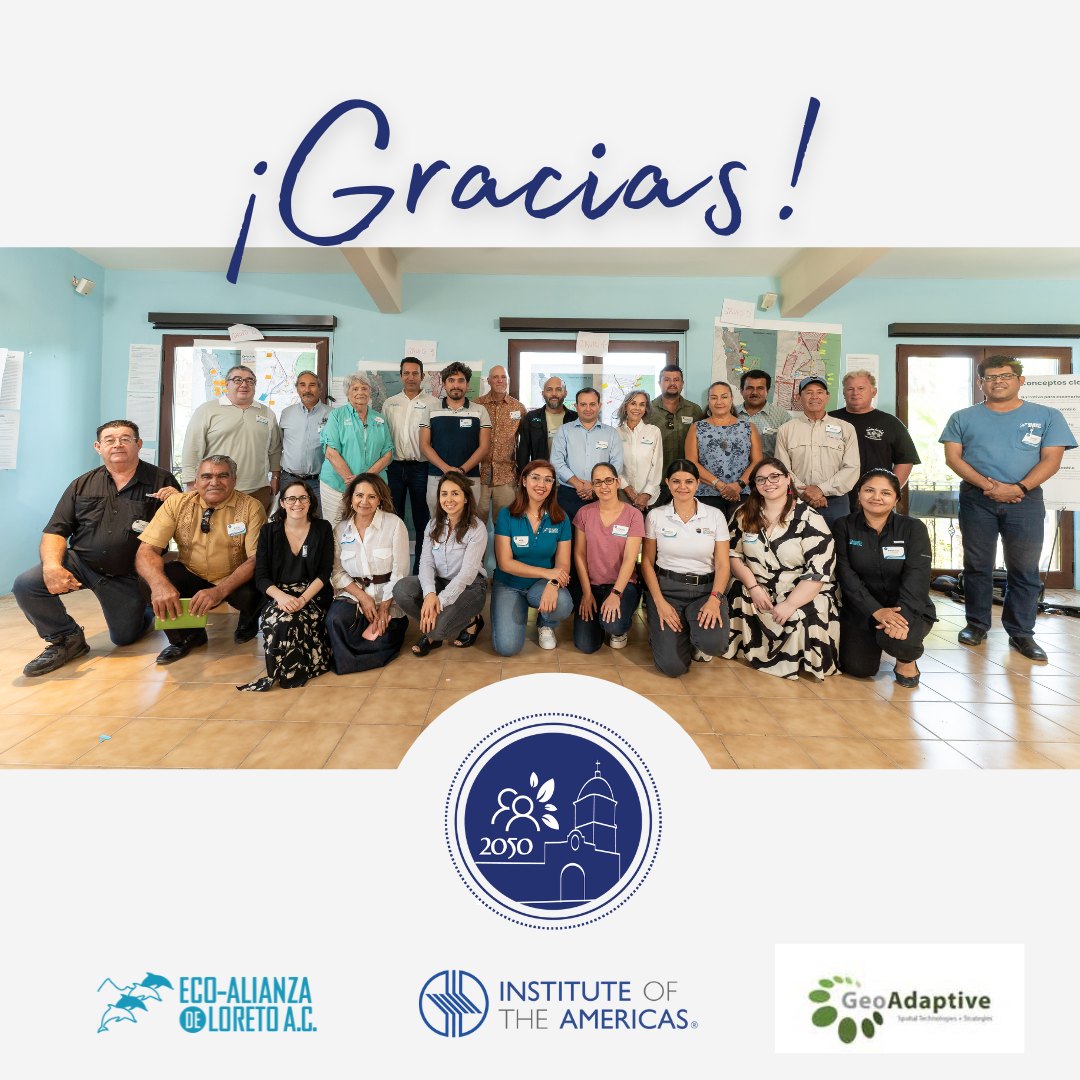
Observatory for Sustainable Taxonomies
Launched by the Climate Finance Group of Latin America and the Caribbean (GFLAC) and Clean Air Policy Center (CCAP) during the UN Latin America Climate Week in October 2023, the mission of the observatory is to encourage the development of sustainable finance taxonomies that are aligned with sustainable development goals, and promote regulated adoption based on environmental, social, and climate safeguards. It will monitor the landscape of taxonomies globally and regionally, to analyze and evaluate deficiencies and knowledge gaps in their development with a focus on LAC nations. The EC2 program of the IOA is a founding board member and will participate in discussion spaces, contribute with research and thought-leadership, and facilitate stakeholder engagement and communication efforts within the region.
25 years of Rocky Reef Monitoring in the Gulf of California

The GCMP celebrated 25 years of continuous scientific research through collaborative efforts with Scripps Institution of Oceanography and the Centro para la Biodiversidad Marina y la Conservación. More than 600 rocky reefs have been monitored, over three million individual organisms representing nearly 800 species have been catalogued, and a database comprising over half a million records has been created and is accessible through GCMP’s dataMares platform.
Not only has this program offered training opportunities for students and early-career scientists but has improved our understanding of the ecological and oceanographic processes influencing the gulf’s productivity, helped develop a model to identify conservation priority areas, analyze climate-induced changes in reef communities, and assess the effectiveness of marine protected areas in the region.
PUBLIC PROGRAMS
The Value of Partnership: Building a More Democratic, Prosperous, and Resilient Western Hemisphere with Assistant Secretary of State for Western Hemisphere Affairs, Brian A. Nichols
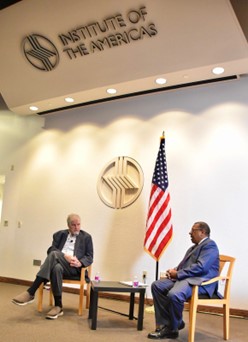
U.S. Assistant Secretary for Western Hemisphere Affairs, Brian A. Nichols, stressed American diplomacy’s power and purpose during his October 10th remarks. He advocated for re-engaging, revitalizing, and re-imagining alliances to address challenges in the Western Hemisphere.
Nichols highlighted the significance of regional collaboration in tackling issues such as democratic erosion, pandemic-induced economic challenges, corruption, climate change, and humanitarian crises.
He discussed the exploitation of instability by authoritarian powers and outlined U.S. leadership efforts to build a more democratic, equitable, prosperous, and resilient hemisphere through support for nations like Nicaragua, Cuba, and Venezuela, defending election integrity in Guatemala, and aiding Brazil and Peru in constitutional matters. Nichols reaffirmed the U.S. commitment to safeguarding democracy through the Organization of American States (OAS).
Watch Recording »
A Conversation with Senator Chris Dodd, Special Presidential Advisor for the Americas, on U.S. Foreign Policy in the Americas & Changing Geo-Politics
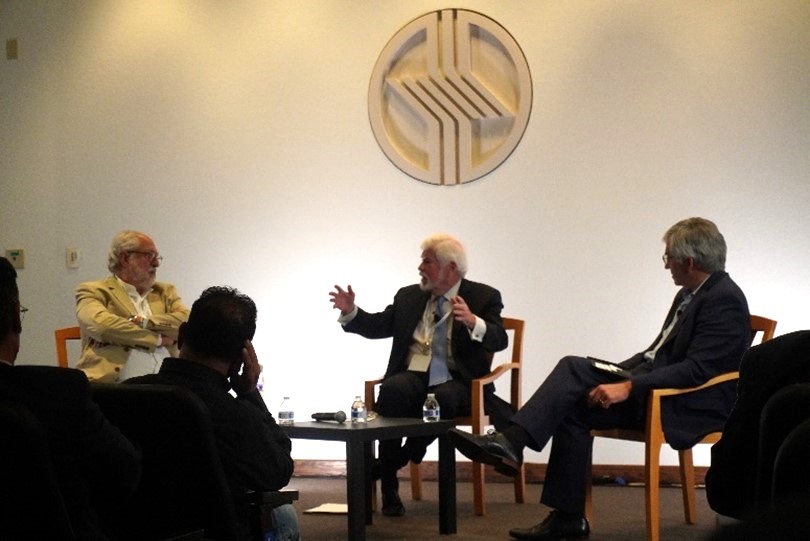
In his keynote address, Honorable Chris Dodd emphasized President Biden’s commitment to strengthening U.S.-Latin America ties, acknowledging shared values and goals. Dodd highlighted the region’s vast natural and human resources, emphasizing its significant economic potential. Urging action on economic challenges driving inequality and migration fears, Senator Dodd called for coordinated efforts, uniting political and financial interests to provide expanded economic opportunities and security.
He advocated for enhanced collaboration among governments, the private sector, and international partners, emphasizing regional economic integration, particularly in economic and energy policies. Dodd stressed the private sector’s pivotal role in driving investment and creating quality jobs, underscoring the importance of seizing the current unique moment in the region, where most democracies prevail, emphasizing the windows of opportunity that must be promptly seized. Watch Recording »
Our People
Thank you!
A Tribute to Malin Burnham and Santiago Soldati for their Service and Philanthropic Support
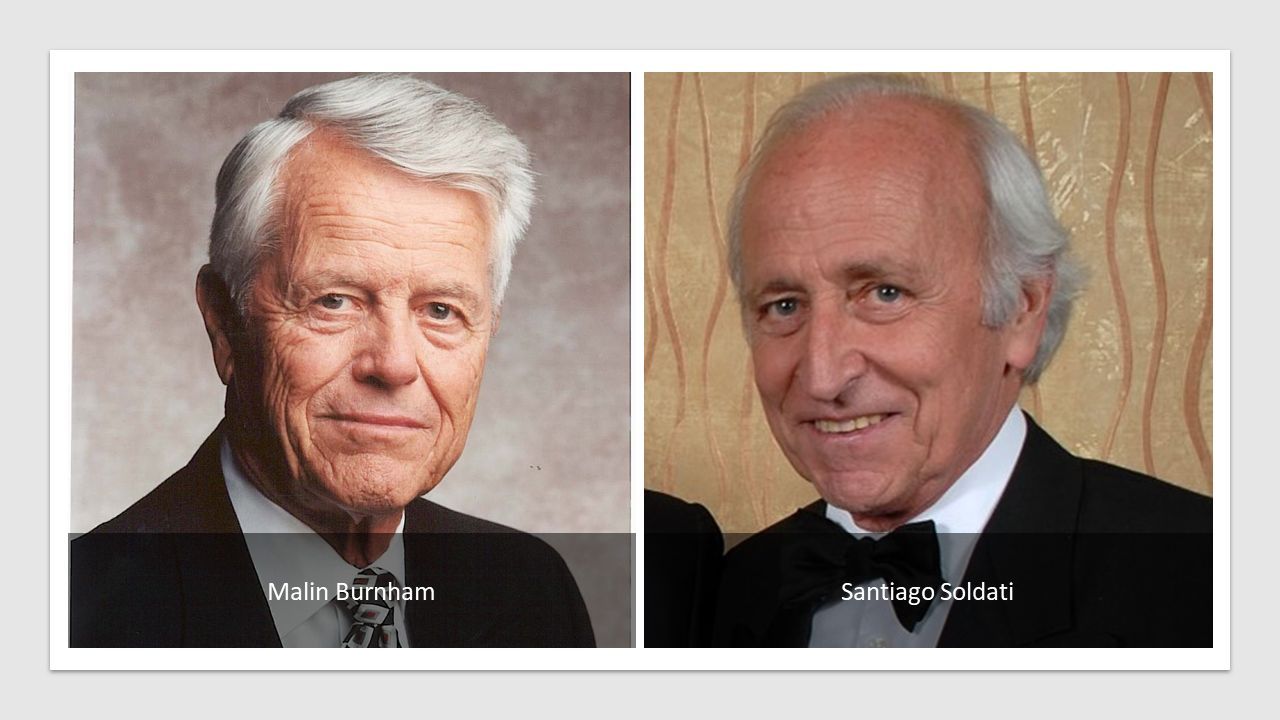
In 2023, two of the Institute of the Americas’ longstanding board members, Malin Burnham, and Santiago “Santi” Soldati retired after over two decades of service on our board. We are profoundly grateful for the many years of service provided by both Malin and Santi over the years. Read more »
Welcome to our new EC2 Interns!
Upcoming Events
IOA In The News
A Cold Shower Energy Matters
How Will Javier Milei Change the Energy Sector in Argentina? Energy Advisor | The Dialogue
What Challenges Face Mexico’s New Energy Minister? Energy Advisor | The Dialogue
Guatemala prepara el terreno para el almacenamiento en el mercado mayorista Energía Estratégica
Destacada participación tuvo delegación chilena en XXXII La Jolla Energy Conference World Energy Council Chile
Aumento de la temperatura del golfo de California afecta arrecifes rocosos El Organismo
José Luis Manzano: “La Argentina tiene que transformarse en un proveedor confiable” El Cronista
State Department official calls current wave of migration ‘unprecedented,’ with 28 million ‘on the move’ Border Report



